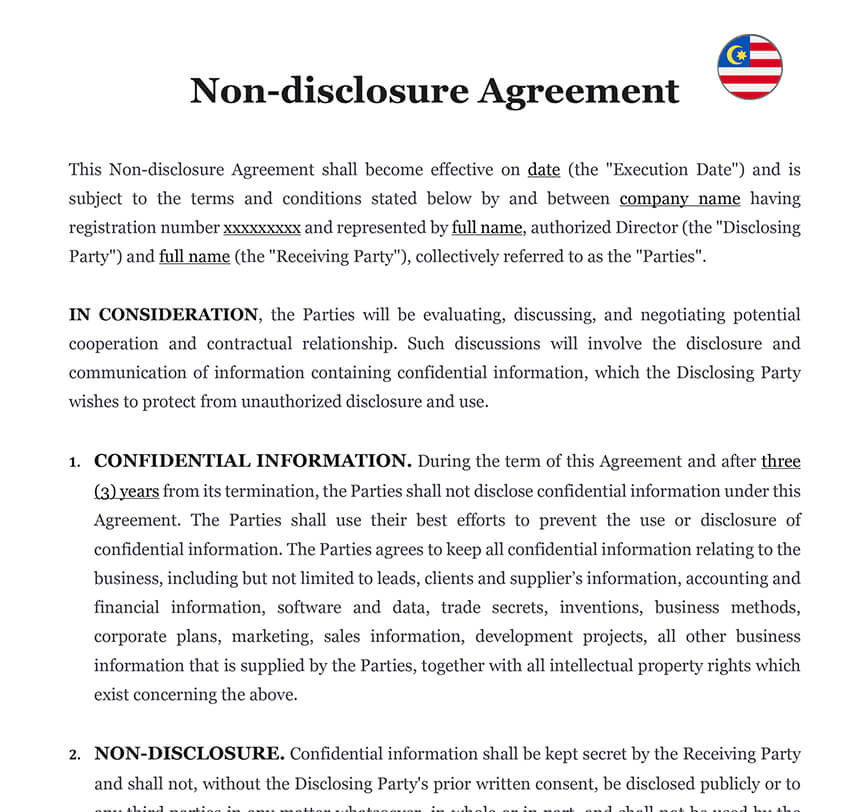Ready to use legal template
Drafted by experienced lawyers
Compliant with Malaysian law
Ready to use legal template
Drafted by lawyers
Compliant with Malaysian law
Home › Business contracts › Non-disclosure agreement (NDA)
Learn more about Non-disclosure agreement (NDA)
A Non-Disclosure Agreement (NDA) is a legally binding contract that protects confidential information shared between parties. It ensures that sensitive business data, trade secrets, intellectual property, and proprietary information remain secure and cannot be disclosed to third parties without permission. Having an NDA in place is essential for startups, corporations, and individuals to establish clear confidentiality terms and prevent unauthorized use or disclosure of valuable information. A well-drafted NDA aligns with Malaysia’s legal framework, including the Contracts Act 1950 and the Personal Data Protection Act 2010, providing strong legal protection in case of breaches. Download our professionally drafted NDA, fully editable in Word format, tailored for use in Malaysia.
Table of contents
What is a Non-Disclosure Agreement (NDA)?
A Non-Disclosure Agreement is frequently used in business to maintain the confidentiality of private information supplied to another party or communicated during the course of business. Non-Disclosure Agreements are frequently referred to as “Confidentiality Agreements” or simply “NDAs.” A secrecy agreement is occasionally a confidentiality clause inserted in another contract, such as an employment contract or a service agreement.
What is the role of a Non-Disclosure Agreement?
A Non-Disclosure Agreement serves two functions: secrecy and protection. A confidentiality agreement might safeguard information ranging from product specifications to client rosters. A NDA establishes the legal basis for preventing ideas and information from being stolen or disclosed to rivals or third parties. An NDA serves three fundamental purposes:
| ➤ Identifying protected information: NDAs categorize information by creating a line between what is secret and what can be revealed. This permits the parties to work freely within the confines of the confidentiality agreement. |
| ➤ Safeguarding sensitive data: Signing an NDA establishes a legal commitment to keep sensitive material private. Any disclosure of the information is a breach of contract. |
| ➤ Protecting patent rights: Because public revelation of a pending innovation can often terminate patent rights, an NDA can shield an inventor as they develop their new product or concept. |
What is included in the NDA?
The NDA has numerous common components, including the following:
| ➤ Parties to the Agreement, a detailed description of the parties. Except under a bilateral or reciprocal Non-Disclosure Agreement, the parties shall be referred to as "the disclosing party" and "the receiving party." |
| ➤ Definition of "Confidential Information" |
| ➤ Private Information Obligations, describing explicitly the information that is anticipated to be kept confidential; how long it should be kept confidential; and when and how such information can be utilized by the other party. |
| ➤ The agreement's effective date and length. |
| ➤ How the data will be returned or deleted upon termination. |
What are the different types of Non-Disclosure Agreement?
Non-Disclosure Agreements can be unilateral or bilateral:
| ➤ A Unilateral agreement: is a one-sided agreement in which only one party gives sensitive information and the other party is required to keep it secret and not disclose it to others. |
| ➤ A Bilateral agreement: requires both parties to share secret information in order to preserve and secure the information from other parties. |
When to use a Non-Disclosure Agreement?
The following are some examples of when you would wish to employ a Non-Disclosure Agreement:
| ➤ When employing the services of another company or a person when such firm or individual will be given access to sensitive or private information of your organization |
| ➤ When workers are given access to the company's confidential information while on the job |
| ➤ While pitching a business proposal to a venture capitalist, possible partner, or investor |
| ➤ While sharing financial, legal, and other company facts with a potential acquirer of your firm |
What is "Confidential Information" in Malaysia?
There is no standard definition or list of what constitutes confidential information. The party sharing the secret information would generally prefer to define confidential information as broadly as possible to guarantee that the other party does not abuse the information. For example, “Confidential Information” refers to any information and documents pertaining to the business of the disclosing firm and can occasionally be considered to include any spoken information provided. The receiving party, on the other hand, would like private information to be defined as material that is identified in writing as “confidential.”
What happens in case of breach?
Breach of confidentiality duties may result in irreparable harm, injury, loss, and damage to the Disclosing Party, the degree of which may be hard to measure and which cannot be entirely compensated by monetary damages.
- Remarks:
In addition to any other legal or equitable remedies available to the Disclosing Party, the Disclosing Party will often seek injunctive or other equitable action against the Receiving Party to prevent any subsequent or ongoing breach of the Receiving Party’s duties.
SPECIAL OFFER
Startup
15 Document Package
Essential documents for running your business in Malaysia
Non-disclosure AgreementTemplate (.docx)
Save on attorney fees
310 client reviews (4.8/5) ⭐⭐⭐⭐⭐
Share information
Why Themis Partner ?
Make documents forhundreds of purposes
Hundreds of documents
Instant access to our entire library of documents for Malaysia.
24/7 legal support
Free legal advice from our network of qualified lawyers.
Easily customized
Editable Word documents, unlimited revisions and copies.
Legal and Reliable
Documents written by lawyers that you can use with confidence.




